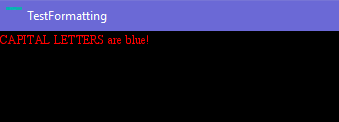I thought I’d attempt to implement the setTextFormat function in the TextField class but I’m having a bit of trouble understanding the TextEngine code base.
My current code is this:
import openfl.text.TextField;
import openfl.text.TextFormat;
import openfl._internal.text.TextFormatRange;
@:access(openfl._internal.text.TextEngine)
@:access(openfl._internal.text.TextFormatRange)
class ExtTextField extends TextField
{
public function new()
{
super();
}
override public function setTextFormat(format:TextFormat, beginIndex:Int = 0, endIndex:Int = 0):Void
{
var formatRange = new TextFormatRange(format, beginIndex, endIndex);
__textEngine.textFormatRanges.push(formatRange);
__layoutDirty = true;
__updateLayout();
}
}
Now after looking at the code of the __updateLayout() I thought that in theory the format ranges would apply, but that didn’t seem to do anything. Without a debugger, it’s very difficult to identify exactly what the problem is.
The code I am testing with is the following:
var txt = new ExtTextField();
txt.defaultTextFormat = new TextFormat("Times New Roman", 12, 0xFF0000);
txt.autoSize = TextFieldAutoSize.LEFT;
txt.selectable = false;
txt.text = "CAPITAL LETTERS are blue!";
txt.setTextFormat(new TextFormat("Times New Roman", 12, 0x0000FF), 0, 14);
addChild(txt);
I have the following results with the above code:

Not sure what I’m missing.
I managed it in the end:
if (__textEngine.textFormatRanges.length > 0) {
var range = __textEngine.textFormatRanges[__textEngine.textFormatRanges.length - 1];
range.end = beginIndex;
if (endIndex == 0)
endIndex = text.length;
var formatRange = new TextFormatRange(format, beginIndex, endIndex);
__textEngine.textFormatRanges.push(formatRange);
}
else
{
var formatRange = new TextFormatRange(format, beginIndex, endIndex);
__textEngine.textFormatRanges.push(formatRange);
}
__layoutDirty = true;
__updateLayout();
1 Like
Hi @tienery, thanks for posting this! I’ve been pulling my hair over a ranged setTextFormat all day (works when targeting Flash, but not Mac  ), and this is the closest I’ve been to a solution so far.
), and this is the closest I’ve been to a solution so far.
I’m having some trouble getting this to work, though, and after many hours of struggling I thought I’d ask if you would mind sharing your final ExtTextField class or maybe explaining the second code example a bit more in-depth?
Ah, that only allows you to set formats linearly, meaning that you can only format a new range as long as the previously set range was before the new range, ie.
setTextFormat(format, 16, 20); only works after setTextFormat(format, 0, 15);
For a more robust solution, you can use my fork of OpenFL and use that as a dev repo in Haxelib using haxelib dev here.
Here is the code if you would prefer to use your own class:
if (endIndex > length || (endIndex == 0 && beginIndex > 0))
endIndex = length - 1;
if (beginIndex < 0)
beginIndex = 0;
if (__textEngine.textFormatRanges.length > 0)
{
var newFormatRanges = new Array<TextFormatRange>();
for (i in 0...__textEngine.textFormatRanges.length)
{
var range = __textEngine.textFormatRanges[i];
if ((beginIndex > range.end && endIndex > range.start) || (beginIndex < range.start && endIndex < range.end))
{
newFormatRanges.push(range);
continue;
}
var formatRange = new TextFormatRange(format, beginIndex, endIndex);
if (!(range.start < endIndex && range.end > beginIndex) || beginIndex == 0)
{
newFormatRanges.push(formatRange);
if (range.start < endIndex)
{
range.start = endIndex + 1 > length - 1 ? length - 1 : endIndex + 1;
}
else if (range.end > beginIndex)
{
range.end = beginIndex - 1 < 0 ? 0 : beginIndex - 1;
}
newFormatRanges.push(range);
}
else
{
if (range.start < endIndex)
{
range.start = endIndex + 1 > length - 1 ? length - 1 : endIndex + 1;
range.end = __textEngine.textFormatRanges[i + 1] != null ? __textEngine.textFormatRanges[i + 1].start - 1 : length;
}
var leftRange = new TextFormatRange(range.format, range.start, beginIndex - 1);
newFormatRanges.push(leftRange);
newFormatRanges.push(formatRange);
newFormatRanges.push(range);
}
}
__textEngine.textFormatRanges = newFormatRanges;
}
else
{
var formatRange = new TextFormatRange(format, beginIndex, endIndex);
__textEngine.textFormatRanges.push(formatRange);
}
__layoutDirty = true;
This code needs to be in the setTextFormat function, and if you’re using your own class, you’ll need @:access(openfl._internal.text.TextEngine) there, I believe.
TextFormatRange is also in the same package, I believe.
There are plans to patch the pull request for this I made at some point, but of course that’s at the discretion of Josh.
1 Like
Works like a charm, thanks a lot!


 ), and this is the closest I’ve been to a solution so far.
), and this is the closest I’ve been to a solution so far.